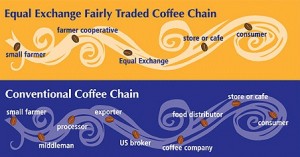Supply Chain Makeover
Fair Trade.
This is one of the new buzz words in the corporate world. With sustainability and social responsibility becoming increasingly important, supply chains are being revamped to meet this new standard ethical operations management.
Good ‘ol wikipedia defines fair trade as ” an organized social movement and market-based approach that aims to help producers in developing countries obtain better trading conditions to promote sustainability. It is primarily practiced in the agricultural industry which produces goods such as bananas, honey, tea, coffee, and cocoa; foods which are imported. Fair trade import organizations make sure that less money goes to the middlemen (distributors and retailers who mark up the coffee by as much 1500%) and more goes to the independent farmers and their communities.
The US OCDC outlines the Differences between a Fair Trade and Non-Fair Trade Coffee Supply Chain
How is fair trade sustainable? Environmentally, it reduces the emissions associated with transportation. Socially, it provides farmers with fair, sustainable wages. Economically, it aids in the development of rural communities. Fair trade is a great example of sustainable product AND process. Like energy efficient cars, fair trade products is still considerably expensive which is a deterrent to consumers. The next step for sustainable industries is to find ways of bringing down the costs so that more people are inclined to use them.



